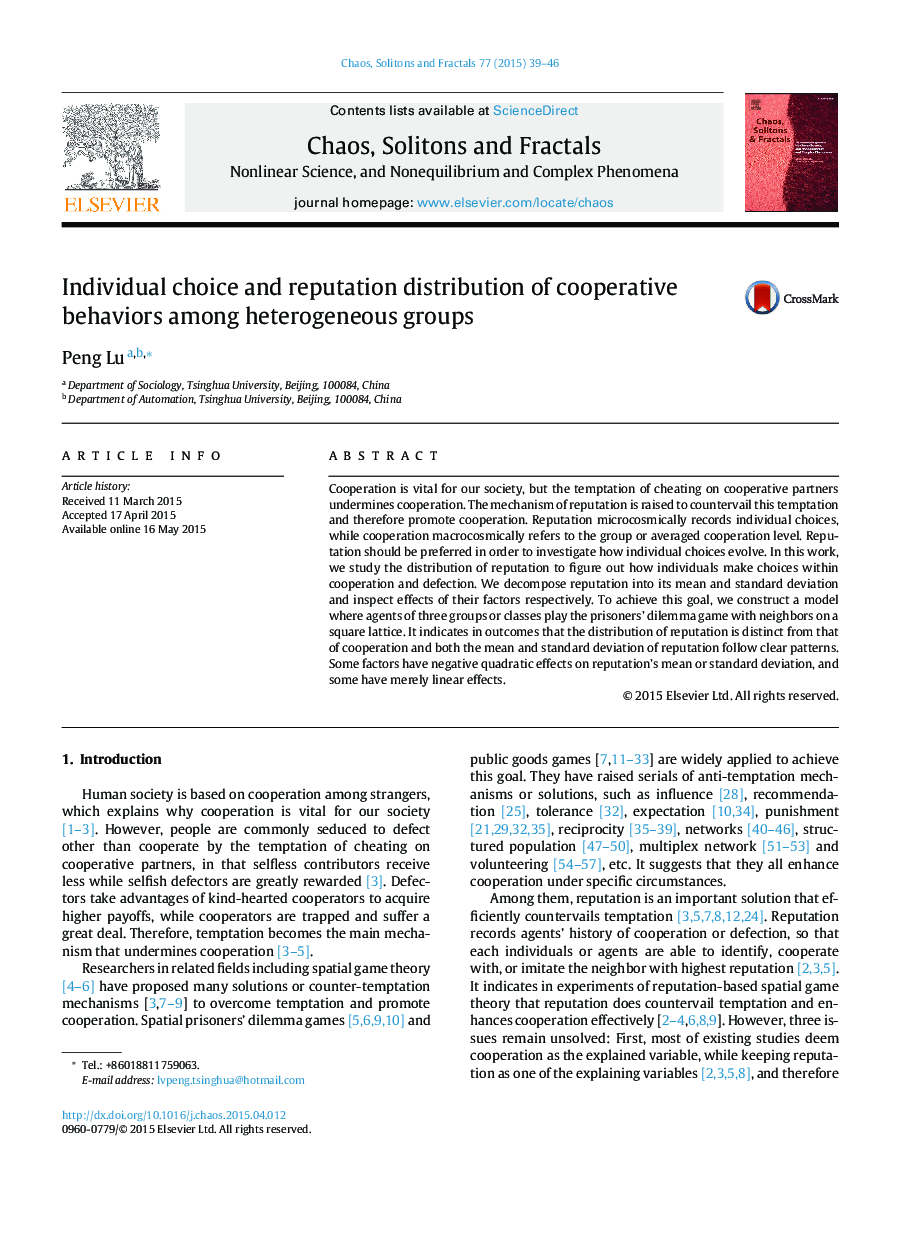| کد مقاله | کد نشریه | سال انتشار | مقاله انگلیسی | نسخه تمام متن |
|---|---|---|---|---|
| 8254832 | 1533647 | 2015 | 8 صفحه PDF | دانلود رایگان |
عنوان انگلیسی مقاله ISI
Individual choice and reputation distribution of cooperative behaviors among heterogeneous groups
ترجمه فارسی عنوان
انتخاب فردی و توزیع شهرت رفتارهای تعاونی در میان گروه های ناهمگن
دانلود مقاله + سفارش ترجمه
دانلود مقاله ISI انگلیسی
رایگان برای ایرانیان
ترجمه چکیده
همکاری برای جامعه ما حیاتی است، اما وسوسه تقلب در شرکای همکاری، همکاری را تضعیف می کند. مکانیسم شهرت برای مقابله با این وسوسه مطرح شده و بنابراین همکاری را ارتقاء می دهد. اعتبار به صورت میکروسکوپی از گزینه های فردی را ثبت می کند، در حالی که همکاری به صورت گروهی یا سطح همکاری به طور متوسط اشاره می کند. اعتبار باید ترجیح داده شود تا بررسی شود که چگونه گزینه های فردی تکامل می یابند. در این کار، توزیع شهرت را مورد مطالعه قرار می دهیم تا دریابیم چگونه افراد در انتخاب همکاری و اختیار تصمیم گیری می کنند. ما شهرت را به میانگین و انحراف معیار خود تقسیم می کنیم و اثرات عوامل آنها را بررسی می کنیم. برای رسیدن به این هدف، ما یک مدل ایجاد می کنیم که عوامل سه گروه یا کلاس بازی معضل زندانیان را با همسایگان بر روی یک شبکه مربع بازی می کنند. در نتیجه نتایج نشان می دهد که توزیع شهرت از همکاری متمایز است و هم میانگین و هم انحراف معیار شهرت، الگوهای روشن را دنبال می کنند. بعضی از عوامل اثرات منفی منفی بر میانگین یا انحراف معیار شهرت دارند و بعضی از آنها فقط اثر خطی دارند.
موضوعات مرتبط
مهندسی و علوم پایه
فیزیک و نجوم
فیزیک آماری و غیرخطی
چکیده انگلیسی
Cooperation is vital for our society, but the temptation of cheating on cooperative partners undermines cooperation. The mechanism of reputation is raised to countervail this temptation and therefore promote cooperation. Reputation microcosmically records individual choices, while cooperation macrocosmically refers to the group or averaged cooperation level. Reputation should be preferred in order to investigate how individual choices evolve. In this work, we study the distribution of reputation to figure out how individuals make choices within cooperation and defection. We decompose reputation into its mean and standard deviation and inspect effects of their factors respectively. To achieve this goal, we construct a model where agents of three groups or classes play the prisoners' dilemma game with neighbors on a square lattice. It indicates in outcomes that the distribution of reputation is distinct from that of cooperation and both the mean and standard deviation of reputation follow clear patterns. Some factors have negative quadratic effects on reputation's mean or standard deviation, and some have merely linear effects.
ناشر
Database: Elsevier - ScienceDirect (ساینس دایرکت)
Journal: Chaos, Solitons & Fractals - Volume 77, August 2015, Pages 39-46
Journal: Chaos, Solitons & Fractals - Volume 77, August 2015, Pages 39-46
نویسندگان
Peng Lu,
